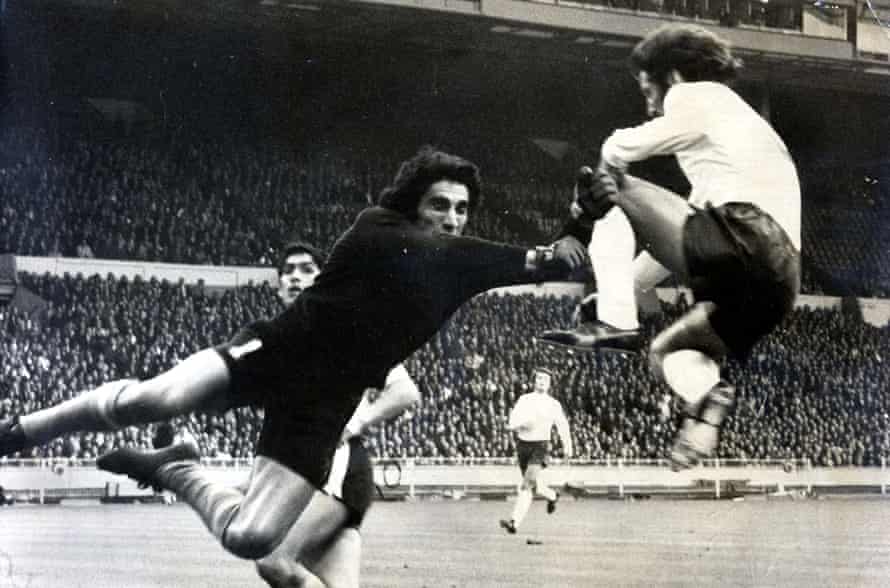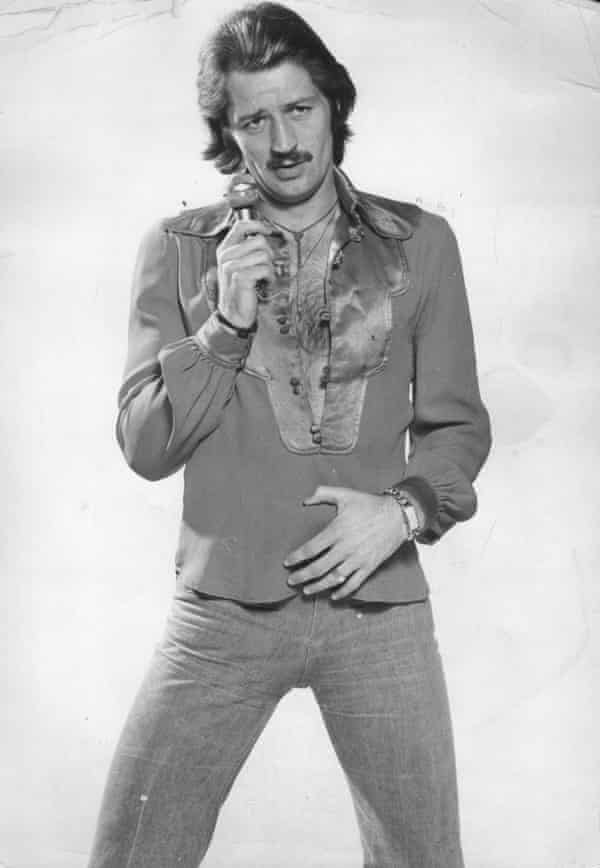The Guardian did not have a reporter at Burnden Park in April 1979 to witness Frank Worthington’s most famous goal, a strike that demonstrated in the space of a few seconds all the flamboyance and flair for which the player, for all sorts of reasons, had become famous. Luckily, people haven’t stopped talking about it since.
“He had his back to goal and we thought we were OK because he was juggling the ball, as he was wont to do,” said Terry Butcher, at the time a 19-year-old Ipswich defender. “I was marking him. I had my hand on his back as I normally do, but I couldn’t win the ball – I couldn’t really see the ball. And then he’s flicked it over me and spun.”
Sam Allardyce, Bolton’s other scorer in a 3-2 defeat, later said: “Worthy was going nowhere when he nodded the ball down, juggled it up and down twice, then flicked it over his head and two defenders and volleyed it into the bottom corner. My description doesn’t do it justice. I never tire of watching it.”
Worthington, whose death after a long illness was announced on Tuesday, was 30, at the third of what by the time he finally gave up ran to 24 clubs, and on his way to winning the First Division golden boot. But his was a particular kind of genius, the kind that still has people purring well over five decades after he made his first-team debut at 18, but that brought him no major trophies and only eight England caps.
Of the national-team managers during his peak years, Alf Ramsey never forgave him for turning up to an under-23 trip in high-heeled cowboy boots and Don Revie played him for 87 minutes across his first two matches before giving up on him. “He got rid of the skill and went for the workers,” Worthington said.

In between them Joe Mercer had seven games as caretaker manager, and picked Worthington for all but one of them. “He is one of the best centre-forwards of all time, and he is a lovely man,” Mercer later said. “He is a target, you can hit him and the ball sticks. He gives you time. He’s got confidence. You can build teams around him. But Revie and Ramsey never fancied him. I just couldn’t understand it.”
Worthington’s combination of charisma and flamboyance was entirely foreign to them both. “I suppose there is something a little showbiz about the way I play,” he said. “Entertainment, live bands, theatre, cabaret, are a big part of my life. I like to be entertained and I like to entertain.”
It was during a game for Leicester against Revie’s Leeds that Worthington found himself on the ball near the corner flag with Johnny Giles at his back, penned in with nowhere to go, so flicked it over both his head and his marker’s, spun and passed to a teammate. “If you ever take the piss out of me or Leeds United again, I’ll break your legs,” Giles growled.
But it was not just his behaviour on the pitch that put some off him. He fell out with one manager after refusing to go on an outing to a vineyard, and with another when he was not allowed to play his favourite Elvis cassette on the team coach.
Then there was the hair, the clothes, the fast cars – Worthington once had four court appearances for driving offences within a single calendar year, including one for doing a U-turn on a motorway in a bright red Ford Mustang – and the womanising. “I admit that I used to get about a bit, but I am quieter these days,” he told the Guardian in 1978. “Instead of going out seven nights a week I keep it to six.”

In 1972 Bill Shankly’s Liverpool agreed a club-record deal to sign Worthington from Huddersfield, only for a medical to pick up the player’s high blood pressure. He was sent on a sunshine break to Mallorca but ignored orders to relax, returned with blood pressure unimproved and the transfer fell through. “Towards the end of my time at Huddersfield I was really abusing my body, and it simply couldn’t go on forever,” he said. “It was a warning from the fellow up there. I knew I had to settle down a bit or I would burn myself out.”
In the following 10 years Liverpool won six league titles and three European Cups while Worthington’s trophy cabinet remained bare. “It didn’t seem all that important at the time, but now I know that if I had gone to Liverpool I wouldn’t have won eight caps, I’d have won 88,” he later said. He moved to Leicester instead, and his attempt to “settle down a bit” involved spending the following summer on holiday in Mallorca with George Best (the mind boggles), where he met the former Miss Sweden Birgitta Egermalm. By the time he returned she was pregnant and soon they were engaged, leading to a first attempt at domestic life that was so unsuccessful Leicester eventually paid to move him out of the family home and into a hotel.
Worthington certainly loved the trappings of his sporting success, the cars, clothes and companionship it brought him, but never lost his devotion to the game. “The thing is that I just love playing football. I love the game as much as ever,” he said on joining Tranmere as player‑manager in 1985, aged 37.
After news of his death broke tributes were paid by some of those who had benefited from his enthusiasm including Gary Lineker, with whom he briefly played at Leicester, who described him as “a beautiful footballer, a maverick and a wonderful character who was so kind to this young apprentice”. Ally McCoist, whom Worthington took under his wing during a week-long team-bonding trip to Magaluf with the Sunderland team (the mind boggles) said he was “a brilliant man and a brilliant football player” who was “talented beyond belief”
“Sometimes my life’s been so full that it’s left me physically and emotionally exhausted,” Worthington told the Mirror in 1978. “But if I should drop down dead this minute no one could say I haven’t squeezed the maximum from my life. I’ve got no regrets about anything. After all, we’re only on this earth for a while.”
from Football | The Guardian https://ift.tt/3cYzvqm
via IFTTT

No Comment